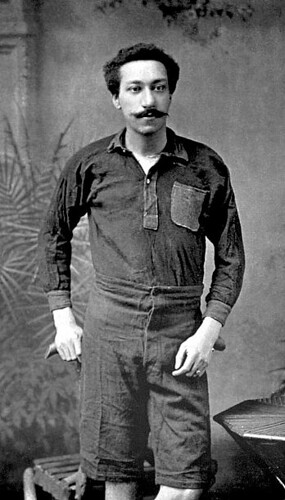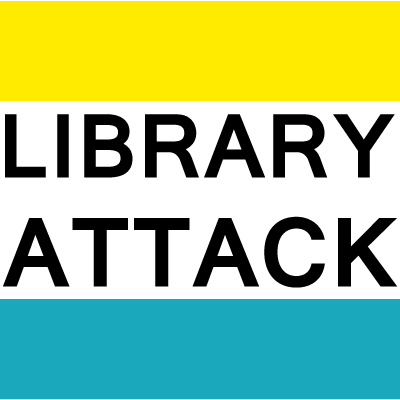
Arthur Wharton, footballer, 1894, originally uploaded by spiralsheep.
You know how I like to dazzle/bore you with football history – here you go. This is Arthur Wharton, the first black professional association football player. He is remarkable in his own right, but I’m using his as an example of the rise of professionalism in football during the 1880s and 1890s. The professional vs. amateur debate took place on the pitches, in the board rooms, and now in history books. It was charged with a socio-economic angle, as the working class clubs in the north moved to pay players (who might otherwise be in the mills or mines), whilst the more privileged clubs in the south argued for amateurism as their players either didn’t need to work or were supplemented by “tea money”. Clearly, professionalism won out, but it took some time.
In libraries these days, professionalism usually means a position requiring an MLIS that is salaried or often the shorthand is “Librarian”. Paraprofessionals tend to be hourly and work in more “staff” roles. We all know this system in some form. There’s been a lot of talk about the de-professionalization of libraries over the years. Why hire an MLIS at a higher hourly rate when you can get more staff positions?
Jason Griffey today shared the story of increasing professionalism at his library. As UTC has been able to streamline and outsource some of their services, they’re seeing an increasing need for agile, professional positions. The organizational structure is changing. In the resulting Friendfeed discussion, I said I’d share my tale in a longer form. Here it is.
Readers of my blog or people who’ve met me know my library has gone through drastic restructuring this year. When I first started working here in 2004 as an undergrad student employee, there were 4 Librarians, 4 parapros, and 12 student employees. Now as we start 2013? There are 2 Librarians and 4 students. We have no staff positions and it’s been tough to work with.
We are a small library that is part of a research institute, not the main library, so we’ve always skewed a bit heavy on the professional side of things. The 2004 staff breakdown looked like this: 2 librarian catalogers, 1 electronic resources (indexing/abstracting) librarian, 1 reference librarian, 1 operations manager/tech processing, 1 tech processing assistant, 1 circulation manager, 1 ILL manager. We were heavy on the technical processing, which was not only for our institute’s research, but really for the whole transportation research community.
Now? The two of us who are left handle research, reference, and tech processing. We’re supposed to add data and research management to the mix as well. Part of this is the “do more with less” that we’re all struggling with, but some of it also reflects the changing landscape. Now that online databases have more content and are more readily accessible, we don’t need to catalog individual articles and conference papers anymore. (Though this lead to the analytic nightmare that we’re left to clean up.) We still index and abstract, but are more target and more efficient. Their system has improved, which allows us to provide better value to the system in less time.
We’ve shrank the physical collection, which took more time and energy than anybody really allowed for. Going forward, we’re going to process less. Does this reflect the changing nature of technical publishing or the changing nature of our space and budget? I’d say both. There’s also more cooperation between transportation research libraries, which helps us focus more on our users and research, knowing that we don’t have to do it all.
While our library doesn’t have to be all things to all people, the remaining librarians really have to be all things to the library. My colleague catalogs, I handle serials and circulation. We both have to have an idea of how everything works so we can figure out what we can fix and what we need somebody else to do. Learning the integrated side of the ILS has been hard, but I don’t see this changing anytime soon. We’re going to have to be able to troubleshoot and diagnose more than before. We both provide research services such as in depth lit reviews or some analysis. We’re much more like special, corporate librarians than academic librarians, which wasn’t always the case.
The library was pushed into this direction though our budget situation which was catastrophic across the institute. The space issue will never go away, but that’s almost a universal on any campus. The nature of the staffing we have was shaped through what services and functions the institute wanted the library to perform going forward, the budget, not so much the union. Really, they want more high-level work that librarians are great at. It is encouraging to know they really value our skills and knowledge and want us here. The problem? Having professional librarians muddle through a lot of the stuff that our staff were perfectly skilled at is a huge time suck. Just because we’re doing a lot less technical processing doesn’t mean we’re doing none. Circulation doesn’t require a huge amount of time or attention, but it does require some.
We’re right now in this state where we have to have our eyes on everything, which makes it hard to really remove ourselves to tackle more in depth projects. I would love to shut myself off and really get my data repository going, but as soon as I start I get an alert about an item in transit, some new journal to check in, or have to come up with something for our students to do. We were spoiled with staff.
I envy Griffey’s position and from talking to people here and at other campuses, I am cautiously optimistic we might see this as a trend. My warning is this though: think about the transition and all the little things and what you’re paying for. Drastic staff changes can happen overnight, but you can’t just drop everything for the new model like that. It take work. We’re not done with the transition yet, but it’s be pretty painful and I really wish we had more wisely focused our efforts when we had the staff to help, but that ship is gone. Someday we’ll be able to swim.

Leave a Reply